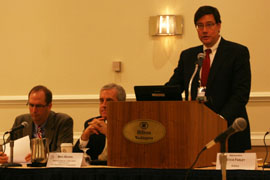State lawmaker pledges to renew fight for ban on texting while driving

WASHINGTON — State Sen.-elect Steve Farley, D-Tucson, said he will reintroduce legislation next year to ban texting while driving, despite repeated rejections in the House, noting that the rest of the country has finally caught up with his idea.
“In January 2007, I was the first legislator in the country to introduce a bill to ban texting while driving,” Farley said Thursday in Washington. “Since then there have been 44 states that have banned it.
“We don’t have that in Arizona and I think that has to be a big push this year to make it happen,” he said.
Farley was speaking in Washington as part of a national legislators’ panel on dangerous driving and on measures that different states have taken to prevent texting, drinking and other hazardous behaviors behind the wheel.
Although he has focused more intently on distracted drivers, Farley told the panel at the National Conference of State Legislatures’ fall forum that the battle against drunken drivers isn’t done, in Arizona or elsewhere.
“When you’re texting and driving, you’re only impaired for the few seconds where you’re texting,” Farley said. “With drunk driving you’re impaired for the entire time you’re driving.”
Washington state Rep. Roger Goodman, who joined Farley on Thursday’s panel, has successfully passed several bills toughening his state’s laws against driving under the influence. His bills came out of DUI work groups he set up that brought together state police, legislators, lawyers, judges and people affected by drunken drivers.
He discussed work to require that convicted drunken drivers install “ignition interlock devices” – essentially in-car breathalyzers that keep a drunk from starting the engine – which he said has led to safer roads in Washington.
“We have reduced impaired driving and we have reduced deaths probably in half,” Goodman said. “But we have another half to go.”
Other changes have addressed the culture around drunken driving in his state, where an anti-DUI slogan was “Drive hammered, get nailed” – a slogan that he admitted welcomed drunken driving.
“So now it is, ‘Drive sober or get pulled over.’ It is just changing words, but it is also a culture change,” Goodman said.
Arizona officials have worked consistently with the legislature and state organizations to reduce the number of impaired drivers, said Kevin Biesty, government relations director for the Arizona Department of Transportation.
“The Governor’s Office of Highway Safety, Department of Public Safety and ADOT have worked collaboratively to try to reduce the number of drivers that are driving under the influence,” Biesty said outside Thursday’s panel in Washington.
“The debate has also been raging on at the legislature about texting and talking on cell phones while driving,” he said.
While Biesty said tougher policies can best address the issues with impaired driving that were discussed Thursday, he said ADOT has taken steps on its own to improve road safety in Arizona.
“That is where our focus has been,” Biesty said. “We find high-crash corridors and address it through engineering, education and things like that.”
For Farley, sessions like Thursday’s help him get policy ideas to bring back to Arizona and let him share his experience with texting laws, which has helped spread such laws throughout the country.
“The more we can learn from people in other states and the successes they have had is a good thing,” Farley said. “People are increasingly cognizant of issues with impaired driving, whether it’s distracted or substance abuse. These are major problems.”
Farley, a House member since 2007 who was elected to the state Senate this year, said those problems keep him pressing on, despite his repeated failure to win passage of a texting-while-driving ban in the House.
Farley is already working on a texting-ban to introduce in the 2013 Senate and he said Sen. John McComish, R-Ahwatukee, is working on a bill to ban any cell phone use behind the wheel for drivers under 18. A McComish bill to do that passed the Senate in 2012 but died in the House.
“I’ve been working with other senators, Democrats and Republicans,” Farley said of his bill. “This is something that isn’t a partisan issue and shouldn’t be a partisan issue.”















